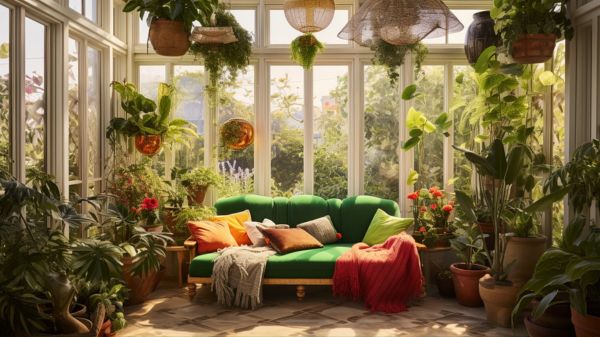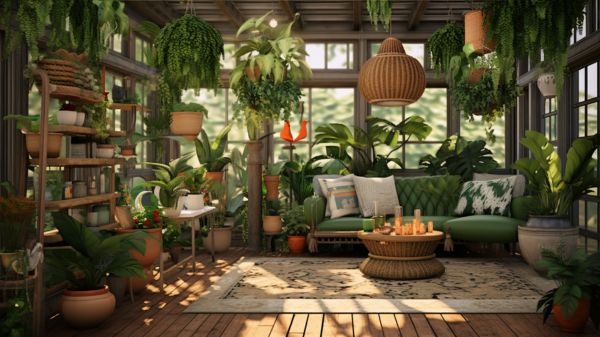Looking to boost your health and well-being? Dive into the world of indoor plants! Like a breath of fresh air, incorporating these green companions into your home can have a multitude of benefits.
Whether you’re a seasoned plant enthusiast or just starting out, discover the power of plants for your physical and mental well-being.
From air-purifying wonders to low-maintenance options, aesthetically pleasing varieties, and even plants with medicinal properties, this article will guide you on a journey to enhance your living environment and embrace the incredible benefits that indoor plants bring to your life.
Air-Purifying Indoor Plants
When it comes to improving the air quality in your home, you can’t go wrong with incorporating air-purifying indoor plants into your space. Indoor plants not only add beauty and charm to your living environment, but they also offer numerous benefits for your health and well-being.
These green companions play a crucial role in air purification by removing harmful toxins and pollutants from the air, creating a healthier indoor environment for you and your loved ones. By carefully selecting the right indoor plants, such as spider plants, peace lilies, rubber plants, and snake plants, you can create a space that promotes better health and well-being.
These plants not only enhance the aesthetic appeal of your home, but they also have a positive impact on your overall well-being. So, why not create a healthy indoor environment by incorporating these air-purifying indoor plants into your space?
Easy-to-Maintain Plants for Beginners
To continue improving the air quality in your home, let’s explore some low-maintenance plants that are perfect for beginners like you. Here are some beginner-friendly plant options that require simple care and are easy to grow as indoor houseplants:
- Spider plants: These plants are easy to grow and require little attention. They can remove up to 95% of toxic formaldehyde from the air.
- Peace lilies: These plants are easy to take care of and don’t require much light. They help remove carbon dioxide and volatile organic compounds (VOCs) from the air.
- Rubber plants: These plants are easy to take care of and only need watering once a week. They’ve air-purifying properties.
- Snake plants: These plants are decorative and extremely low-maintenance. They remove toxins from the air over time.
- Pothos plants: These plants are easy to grow and only need indirect sunlight and infrequent watering. They lower indoor ozone levels and remove VOCs from the air.
- Succulents and cacti: These plants thrive on little to no care and can help clean the air.
With these low maintenance indoor plants, you can enjoy the benefits of improved air quality without the hassle of complex care routines.
Beautiful and Aesthetically Pleasing Plants
If you’re looking to add some beauty and style to your indoor space, there are several aesthetically pleasing plants that can continue to improve the air quality in your home.
One way to enhance the visual appeal of your indoor plants is by using unique planters. Get creative and explore different ways to display your beautiful indoor plants, such as using vintage teacups or repurposed mason jars.
Another aspect to consider is colorful foliage. Look for plants with vibrant and eye-catching leaves, like the calathea with its intricate patterns or the croton with its bold hues.
To create a stunning visual effect, incorporate hanging plants into your indoor decor. Spider plants or pothos plants are great options that cascade down from their hanging planters, adding a touch of elegance to any space.
For those who appreciate stunning blooms, there are flowering beauties like orchids or peace lilies that produce exquisite flowers in a variety of colors.
Lastly, consider creating miniature gardens with tiny, aesthetically pleasing plants. Succulents and air plants are perfect for this, as they come in various shapes and sizes, allowing you to design your own mini indoor landscape.
Medicinal Properties of Houseplants
As you continue exploring the benefits of houseplants, it’s important to consider the medicinal properties they possess. Houseplants have been found to offer various medicinal benefits, making them more than just beautiful additions to your home.
Here are some therapeutic plants with healing properties and the potential for herbal remedies:
- Aloe vera: Known for its soothing properties, aloe vera can help heal cuts, burns, and other skin ailments.
- Chamomile and lavender: These herbs have been found to reduce anxiety and promote relaxation.
- Ginger and turmeric: Both of these herbs have anti-inflammatory properties, which can be beneficial for certain health conditions.
Health Benefits of Herbs
By incorporating herbs into your daily routine, you can experience the numerous health benefits they offer. Herbal remedies have been used for centuries to promote overall health and well-being. One of the main benefits of herbal remedies is their soothing effect on digestive issues. Certain herbs, such as chamomile and peppermint, are known for their ability to calm an upset stomach and relieve indigestion.
Additionally, herbal teas made from these herbs can promote relaxation and improve sleep quality. The healing properties of plants extend beyond digestion. Many herbs contain vitamins, minerals, and antioxidants that are beneficial for your dietary routine. Incorporating herbs into your daily life can enhance your overall health and contribute to a sense of well-being.
Soothe your body and mind with the power of herbs.
Mental Health Benefits of Plant Care
Caring for indoor plants can significantly improve your mental health and well-being. Engaging in plant care offers a range of therapeutic benefits that promote stress reduction, mood enhancement, improved concentration, and a sense of accomplishment.
Here’s how plant care can positively impact your mental health:
Stress reduction:
- Taking care of plants provides a calming and meditative experience, reducing stress and anxiety.
- Engaging with nature helps lower cortisol levels, the hormone associated with stress.
Mood enhancement:
- Being around plants triggers the release of endorphins, the brain’s natural mood boosters.
- The vibrant colors and soothing scents of plants can uplift your mood and create a positive environment.
Improved concentration:
- The act of caring for plants requires focus and attention, helping to improve concentration and cognitive function.
- Having greenery in your workspace can enhance productivity and creativity.
Incorporating plant care into your daily routine can provide numerous mental health benefits, improving your overall well-being and creating a sense of belonging to nature.
Importance of Connecting With Nature
Connecting with nature through indoor plants can have significant benefits for your well-being. The healing power of nature has been well-documented, and incorporating green spaces into your indoor environment can help you reconnect with the natural world.
Nature therapy, also known as ecotherapy, emphasizes the benefits of spending time outdoors and immersing yourself in nature. However, for those who may not have access to outdoor green spaces, indoor plants can provide a similar sense of connection.
The presence of plants indoors can mimic the calming and soothing effects of being in nature, reducing stress and promoting a sense of peace and tranquility. By surrounding yourself with indoor plants, you can experience the benefits of nature therapy and improve your overall mental and emotional well-being.
Houseplants as Complementary Treatment

Incorporating houseplants into your indoor environment can provide a complementary treatment option for improving your overall health and well-being. Houseplants have long been recognized for their therapeutic power and the benefits they bring to holistic wellness. Here are some ways that houseplants can be used as therapy:
- Aloe vera plants have medicinal properties and can help heal cuts, burns, and other skin ailments.
- Chamomile and lavender herbs can reduce anxiety and promote relaxation.
Benefits of indoor gardening:
- Caring for plants reduces stress, anxiety, and improves mood and concentration.
- Plant care promotes a sense of control and overall wellness.
Incorporating these plants into your daily routine can enhance your overall health and provide a sense of pride in nurturing and caring for living organisms.
Oxygen-Boosting Indoor Plants
To boost the oxygen levels in your indoor space, consider adding these oxygen-boosting plants. Snake plants, spider plants, rubber plants, peace lilies, ferns, and English ivy are all excellent choices. These plants not only enhance the aesthetic appeal of your home but also have numerous benefits for your health and well-being.
Oxygen-rich environments are crucial for maintaining good indoor air quality, which is essential for your overall health. By increasing the oxygen levels in your space, these plants can enhance your focus and productivity, create a calming and stress-free atmosphere, and contribute to clearer thinking. Spending time in oxygen-rich spaces can also have long-term health benefits.
Plants as Natural Remedies

By incorporating plants into your daily routine, you can harness their natural remedies for various health conditions. Plants offer a wide range of benefits, including natural remedies for common ailments and healing properties for skin conditions.
Additionally, certain plants, such as eucalyptus, provide respiratory benefits that can improve breathing and alleviate congestion. Incorporating herbs into your daily routine can also enhance your overall health. Herbal teas, for example, can soothe digestive issues and promote relaxation.
Whether it’s incorporating aloe vera for skin conditions or enjoying the respiratory benefits of eucalyptus, plants have the potential to enhance your well-being in various ways. So why not explore the world of natural remedies and start reaping the benefits of plants in your life?
Frequently Asked Questions
Can Indoor Plants Completely Eliminate Toxins From the Air?
Indoor plants can significantly reduce toxins in the air, but they can’t completely eliminate them. They improve air quality, provide numerous health benefits, and create a healthy indoor environment that reduces stress.
Are There Any Indoor Plants That Require Little to No Sunlight?
Low light plants, also known as shade loving indoor plants, are perfect for dark rooms or spaces with low sunlight. These easy care plants thrive with little to no sunlight, making them ideal for those without access to natural light.
Can Houseplants Be Used as a Substitute for Professional Mental Health Treatment?
Houseplants can complement professional mental health treatment, but they shouldn’t be used as a substitute. Plant therapy, gardening, and connecting with nature can have powerful benefits for emotional well-being and plant-based self-care.
Do All Oxygen-Boosting Plants Have the Same Health Benefits?
Differentiating benefits: Oxygen-boosting plants, like snake plants and peace lilies, increase oxygen levels and enhance focus and mood. Air-purifying plants, such as spider plants and rubber plants, remove toxins and improve indoor air quality.
Can Plants Alone Cure Common Health Conditions Such as Digestive Issues or Skin Ailments?
No, plants alone cannot cure common health conditions such as digestive issues or skin ailments. While some plants have medicinal properties, they should be used as complementary treatments alongside professional advice and medical care.
Conclusion
Incorporating indoor plants into your home can greatly improve your overall health and well-being. For example, a recent case study found that a woman suffering from anxiety experienced a significant reduction in her symptoms after introducing a peace lily into her living space.
The plant’s calming properties and ability to purify the air created a more serene environment, leading to a noticeable improvement in her mental health. By embracing the power of indoor plants, you can enhance your living environment and enjoy the numerous benefits they offer.




